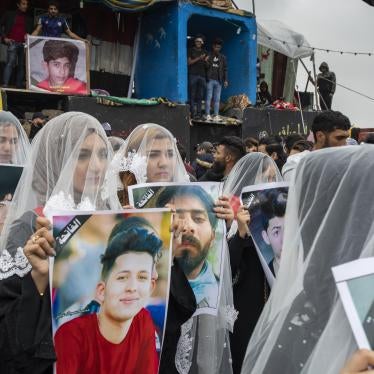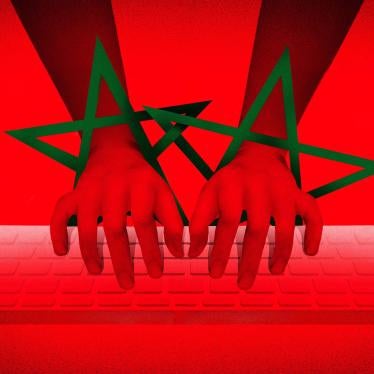(New York) - The Egyptian authorities should drop all charges against Ahmad Mostafa, a 20-year-old engineering student charged with writing about corruption in the military academy on his blog, Human Rights Watch said today. Security officials are prosecuting Mostafa before a military court in a trial that began March 1, 2010.
"The government should not be prosecuting Mostafa at all, much less before a military court, with no possibility of appeal," said Joe Stork, deputy Middle East director at Human Rights Watch. "Instead of looking into his accusations, the government is trying to silence him."
Writing that exposes corruption is protected under Egypt's international obligations, Human Rights Watch said. Article 9 of the African Convention on Human and People's Rights, and article 19 of the International Covenant on Civil and Political Rights, both ratified by Egypt, require Egypt to protect freedom of expression.
Mostafa, a student at Kafr El Sheikh University, in northern Egypt, is a member of "April 6," a political activist youth group, and has a blog called "Maza Asabuki Ya Watan" (What is Ailing You, My Country?). On February 15, 2009, his post, "Scandal in the Military Academy," contended that a teacher whose son was forced to leave the Military Academy later discovered that this was to make room for the son of an influential individual who would make financial contributions to the academy.
Military intelligence officers arrested Mostafa on February 25, 2010, while he was on his way to the Faculty of Engineering at Kafr El Sheikh University, and the prosecutor ordered his detention pending trial, based on a Military Academy complaint about the 2009 posting.
Gamal Eid, director of the Arab Network for Human Rights Information, told Human Rights Watch that military intelligence officers questioned Mostafa on January 17 about his blogging, demanded his password, and then changed his password to keep him from accessing the blog before releasing him that same day. The blog post appears to have come to their attention after Mostafa discussed plans to hold a demonstration during a January visit by President Hosni Mubarak to Kafr el Sheikh with other April 6 members.
The prosecutor concluded the investigation on February 28 and referred the case to the military court in Nasr City, Cairo. The trial began March 1. At the first session, the judge agreed to defense lawyers' request for an adjournment to study the court documents, but only by one day.
The prosecutor charged Mostafa under Law 113 of 1956 and the Penal Code which prohibit "the publication of information considered a secret of the armed forces, spreading false information with the goal of causing harm and insulting officials responsible for admission of students into the military academy." The only evidence presented is the post on Mustafa's blog.
Defense lawyers from the Arab Network for Human Rights Information and the Association for Freedom of Thought and Expression told Human Rights Watch that the judge only allowed them a brief review of the court file and refused to allow them to see a memo regarding the case from the military academy or to take any notes.
Egypt has arrested and detained other bloggers for acts protected by freedom of expression. Kareem Amer, whose real name is `Abd al-Karim Nabil Suleiman, has been in Borg El Arab prison, in Alexandria, since November 7, 2006, for writing about sectarian tensions in Alexandria and criticizing President Mubarak and the Al-Azhar religious institution on his blog. On February 22, 2007, a court sentenced him to four years in prison for "insulting the president," "spreading information disruptive of public order," and "incitement to hate Muslims."
Hany Nazeer, another blogger, is being detained without charge in Borg El Arab prison, under the country's emergency law. State Security officers arrested him at his home in Naga Hammadi, Qena, on October 3, 2008, after he expressed opinions critical of Christianity and Islam on his blog. Mostafa Hanafy, vice president of the Egyptian Council of State and a member of the Egyptian delegation to the United Nations Human Rights Council, told the human rights body on February 17 that the Egyptian government had "made a commitment before parliament to use the emergency law only for terrorism and drug-related crimes and it has only implemented the rules of the emergency law in these cases."
Musad Abul Fagr, a novelist and rights defender who had been outspokenly critical of violation of the rights of Sinai Bedouin, remains in prison under an emergency law order despite several court orders for his release. On July 17, prison officials transferred him to Borg El Arab prison under the 13th emergency law order extending his detention.
Human Rights Watch strongly opposes any trials of civilians before military courts, whose proceedings do not protect due process rights. The African Commission on Human and Peoples' Rights, in interpreting the African Charter on Human and Peoples' Rights, has said that military courts "should not, in any circumstances whatsoever, have jurisdiction over civilians." The Human Rights Committee, the expert body that monitors compliance with the International Covenant on Civil and Political Rights (ICCPR), expressed concern in 2002 that Egypt's "military courts and state security courts have jurisdiction to try civilians accused of terrorism although there are no guarantees of those courts' independence and their decisions are not subject to appeal before a higher court," as required by the ICCPR.
In a 2009 report following his visit to Egypt, Martin Scheinin, UN Special Rapporteur on the promotion and protection of human rights and fundamental freedoms while countering terrorism, reiterated that "the trial of civilian terrorist suspects in military and Emergency Supreme State Security Courts raises concerns about the impartial and independent administration of justice and furthermore does not comply with the right to have a conviction and sentence fully reviewed by a higher court."
During the review of Egypt's record by the UN Human Rights Council, several countries recommended that Egypt stop detaining bloggers under the emergency law and stop trying civilians before military courts. Hanafy, the Egyptian delegation member, told the Council on February 17 that "there are very few cases of [civilians tried before military courts]; the decision [to refer a civilian to a military court] is an administrative one that can be appealed against in all cases."
"The Egyptian government says one thing in Geneva and then immediately makes a mockery of the Human Rights Council's review process," Stork said. "No civilian should be tried before a military court, and no government that claims to respect human rights should be prosecuting someone solely for writing about corruption."





